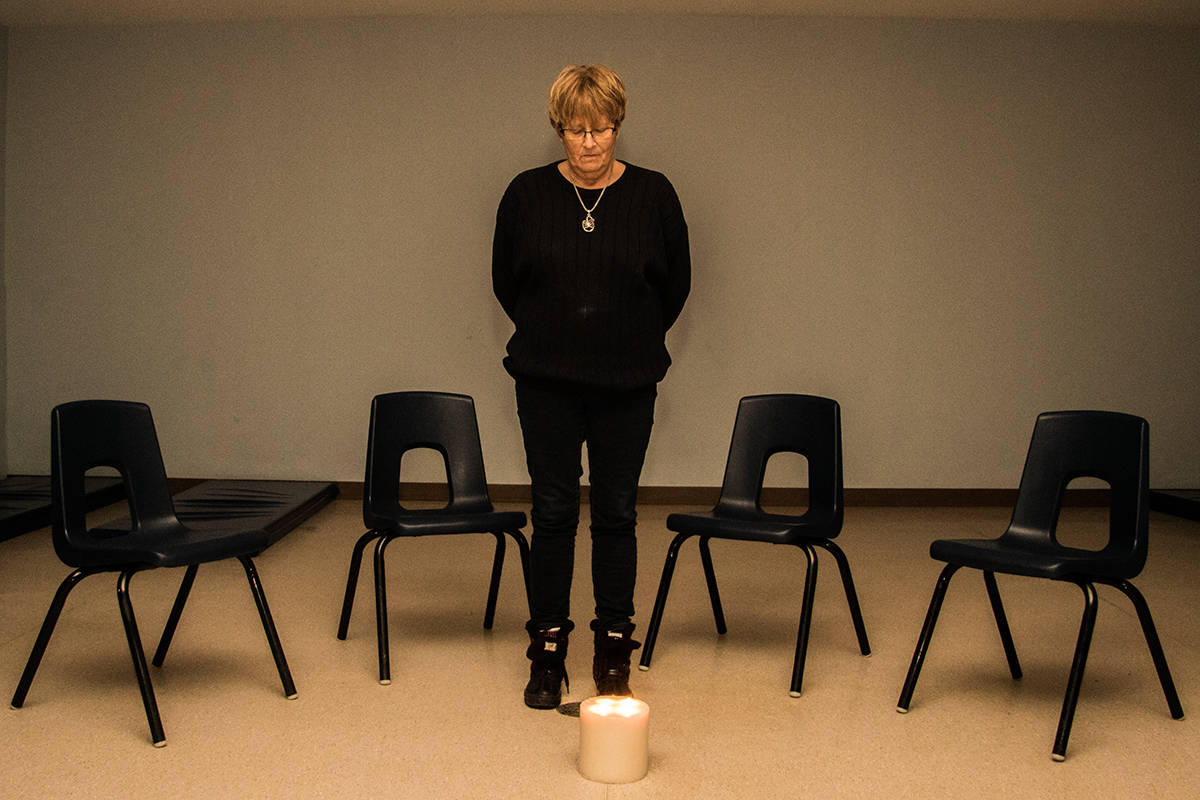On a snowy and bitter-cold day in February, over 50 people came together in a circle to remember a friend they lost.
They all sat around a candle, swapped stories, shared laughs and shed tears for someone who was a fixture in their community.
The people in this circle were friends, family, administration staff, nurses, doctors, social workers and other addicts. Yes, the circle was in memory of someone who had died of a drug overdose. (As requested, the Red Deer Express is not publishing the name of the deceased.)
Safe Harbour Society has been holding the tradition of the Harbour Circle since the first time a client died in detox. The first time was a crisis situation in order to help staff deal with the trauma of losing someone they cared about. With the ongoing opioid crisis, the Harbour Circle has become commonplace, with at least eight overdose deaths in Red Deer since the beginning of 2018.
“I remember when they first started using naloxone in response to opioid overdose,” Safe Harbour Society Executive Director Kath Hoffman said. “That was a big deal. Now it is so normal. It is like putting a band-aid on with how many times it is happening.”
The Circle, according to Hoffman, is a way to help people who, “Need the fuel to keep their light shining.”
This is particularly important for frontline workers who are losing people they care about to drug overdose too frequently.
“They are extraordinary. They keep hearing all of these stories of trauma and pain and they keep their light shining strong through that. Whether buddy is coming back 15 times, it doesn’t matter. They welcome them back every time.”
Hoffman said the staff are doing the most important thing they can do during this crisis, which is connecting with people.
“We know at the end of it all, as the Harbour Circle shows, connection is the thing. That is what everyone spoke about and that is what is helping to sustain them,” she said.
The Harbour Circle is also a way to remind people that the opioid crisis is not about needles, it is about clients who are cared about, loved and watched over.
“In Red Deer right now, we have people feeling different ways about the crisis we are in,” she said. “Some of them are worried about the needles on the ground; others are worried about the appearance or behaviour of the people hanging around and many of us are working on remembering people.
“This crisis is not about opioids; it’s not about bylaws; it’s not about zoning — it is about people in crisis and we need to make sure we have the resources to help them.”
Hoffman recognizes that for some people, harm reduction strategies like supervised consumption sites and handing out needles is a stretch of the imagination. The seriousness of the crisis, however, means these steps are necessary to save lives.
“People may not be there in their heads but that is the reality for the people who are living that life,” Hoffman said. “We don’t know this world and we can’t pretend to. They are the experts in that world and they have told us loudly what they need — 256 people who are using drugs told us.
“We have to listen to them. Wrap some science and money around that and we are good to go.”
Hoffman added it is important to remember that drug users are often medicating trauma and pain.
“We as a society seem to have a tendency to think they are doing it for fun. No one is having any fun,” she said. “It is hard for people to understand it unless they are touched by it. There is so much shame wrapped around addiction — not just for the addict — but for that person’s family.”
Hoffman said the way around this is to stop asking why someone is addicted and instead ask why are they are in pain.
“We know a kid needs to have a whole bunch of things to make their brain grow and develop properly,” Hoffman said. “The three things for sure are glucose, oxygen and, get this one, relationships. All the synapses that are growing need to be in place for that kid to have the resilience they need later on. If that doesn’t happen, it has an effect on people.”
Hoffman said it is important for people to remove shame from the way they view the opioid crisis.
“Come and shine your light,” she said. “We can all shine our light in so many different ways. That isn’t just about donating to us, that means taking a crow bar to your mind and prying it open to find a new understanding or a new story.
“This is not about shame. This is not about low-life users. It is not about that and that kind of thinking isn’t helping anything.”
Hoffman said instead of shaming people, it is important to get educated and remember your friends or family who may have a son or daughter that is struggling with addiction.
“Help us get rid of the shame of this because shame kills people.”
todd.vaughan@reddeerexpress.com
Like us on facebook at https://www.facebook.com/RedDeerExpress/ and follow us on twitter at https://twitter.com/RedDeerExpress.



